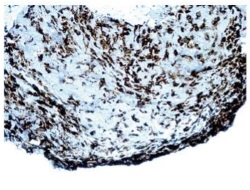The JAK inhibitor tofacitinib suppresses synovial JAK1-STAT signalling in rheumatoid arthritis
Ann Rheum Dis. 2014 Nov 14. pii: annrheumdis-2014-206028. doi: 10.1136/annrheumdis-2014-206028. [Epub ahead of print]
A randomised, double-blind, phase II serial synovial biopsy study in 29 patients with RA with an inadequate methotrexate response was used to evaluate the effect of tofacitinib 10 mg twice daily on synovial tissue and blood biomarkers in active RA compared with placebo at Day 28. Secondary objectives were to evaluate the clinical efficacy, safety and tolerability of tofacitinib.
After 28 days, changes induced by tofacitinib included decreases in the expression of genes implicated in RA, including MMPs and chemokines, along with a rapid and sustained decrease in CXCL10. No overall changes were observed in synovial inflammation score or the presence of T cells, B cells or macrophages. The most important finding of the study was the correlation between suppression of STAT activation and 4-month clinical improvement.
The data suggest that, rather than blocking a single cytokine, tofacitinib modulates JAK1-mediated IL-6 and IFN signalling which play a key role in the rheumatoid synovium.

